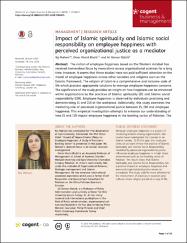| dc.contributor.author | Maham, Raj | |
| dc.contributor.author | Bhatti, Omar Khalid | |
| dc.contributor.author | Öztürk, Ali Osman | |
| dc.date.accessioned | 2020-08-05T12:14:27Z | |
| dc.date.available | 2020-08-05T12:14:27Z | |
| dc.date.issued | 2020 | en_US |
| dc.identifier.citation | Maham, R., Bhatti, O. K. ve Öztürk, A. O. (2020). Impact of Islamic spirituality and Islamic social responsibility on employee happiness with perceived organizational justice as a mediator. Cogent Business and Management, 7(1). https://dx.doi.org/10.1080/23311975.2020.1788875 | en_US |
| dc.identifier.issn | 2331-1975 | |
| dc.identifier.uri | https://dx.doi.org/10.1080/23311975.2020.1788875 | |
| dc.identifier.uri | https://hdl.handle.net/20.500.12511/5674 | |
| dc.description.abstract | The notion of employee happiness based on the Western mindset has received tremendous focus by researchers across organizational sciences for a long time. However, it seems that these studies have not paid sufficient attention on the model of employee happiness across other societies and religions such as the Islamic framework. The religion of Islam is a comprehensive and inclusive code of life which provides appropriate solutions to manage employee happiness concerns. The significance of the study provides an insight on how happiness can be enhanced within organizations by the practices of Islamic spirituality (IS) and Islamic social responsibility (ISR). Employee happiness is observed by individuals practising and demonstrating IS and ISR at the workplace. Additionally, this study examines the mediating role of perceived organizational justice between IS, ISR and employee happiness. This empirical investigation attempts to enhance our understanding of how IS and ISR impact employee happiness in the banking sector of Pakistan. The study uses survey data drawn from 500 employees working in Pakistani banks. Multiple regression is conducted to examine the impact of IS and ISR on employee happiness and perceived organizational justice as a mediator. The implication of this study is useful for trainers, educators, policy makers as practitioners, and researchers from various fields including organizational management, leadership and human development. | en_US |
| dc.language.iso | eng | en_US |
| dc.publisher | Taylor and Francis As. | en_US |
| dc.rights | info:eu-repo/semantics/openAccess | en_US |
| dc.rights | Attribution 4.0 International | * |
| dc.rights.uri | https://creativecommons.org/licenses/by/4.0/ | * |
| dc.subject | Religion | en_US |
| dc.subject | Islamic Spirituality | en_US |
| dc.subject | Islamic Social Responsibility | en_US |
| dc.subject | Employee Happiness | en_US |
| dc.subject | Organizational Justice | en_US |
| dc.title | Impact of Islamic spirituality and Islamic social responsibility on employee happiness with perceived organizational justice as a mediator | en_US |
| dc.type | article | en_US |
| dc.relation.ispartof | Cogent Business and Management | en_US |
| dc.department | İstanbul Medipol Üniversitesi, İşletme ve Yönetim Bilimleri Fakültesi, İşletme Bölümü | en_US |
| dc.authorid | 0000-0002-2409-6532 | en_US |
| dc.identifier.volume | 7 | en_US |
| dc.identifier.issue | 1 | en_US |
| dc.relation.publicationcategory | Makale - Uluslararası Hakemli Dergi - Kurum Öğretim Elemanı | en_US |
| dc.identifier.doi | 10.1080/23311975.2020.1788875 | en_US |
| dc.identifier.scopusquality | Q2 | en_US |




















